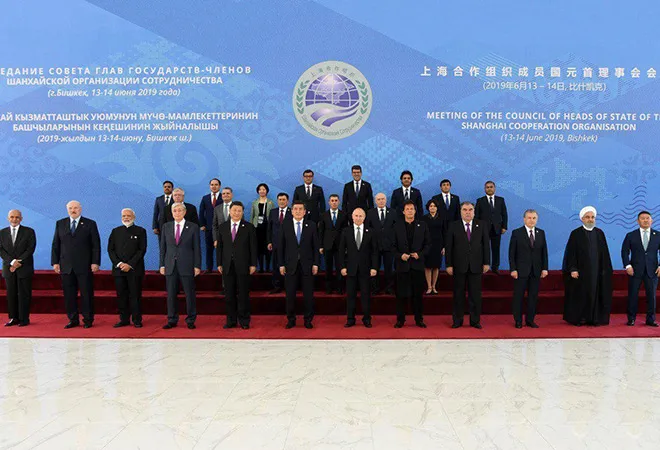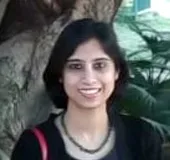
The 2019 Shanghai Cooperation Summit, held in the Kyrgyz capital Bishkek on June 13-14, marked the second year in which India participated as a full member. While much of the media hype in India surrounded the will it/won’t it happen meeting between Indian PM Narendra Modi and Pakistani PM Imran Khan (which ultimately resulted in an exchange of pleasantries), the summit saw several key bilateral meetings that took place apart from the multilateral meeting of the Heads of State. The summit also garnered increased scrutiny on account of ongoing tensions in West Asia and the US-China trade war. The presence of Iran and Afghanistan as observers also makes it an important venue to discuss vital regional issues.
Prime Minister Narendra Modi in his address to the SCO leaders presented his vision for the organization in the form of HEALTH (healthcare cooperation, economic cooperation, alternate energy, literature and culture, terrorism-free society and humanitarian cooperation). Elaborating on these pointers, Modi called upon member states to ensure that nations which support, promote or finance terror must be held accountable – referring to Pakistan without explicitly naming it. Modi also stressed using the potential of RATS to counter terrorism.
Prime Minister Narendra Modi in his address to the SCO leaders presented his vision for the organization in the form of HEALTH (healthcare cooperation, economic cooperation, alternate energy, literature and culture, terrorism-free society and humanitarian cooperation).
With regard to economic cooperation, Modi criticized protectionist tendencies in trade amidst the US ending GSP status for Indian products with New Delhi getting ready to respond and the ongoing US-China trade war. In fact, Modi’s HEALTH vision was closely tied to the Bishkek Declaration, which also noted ongoing and future cooperation in healthcare, trade, counter-terrorism and response to natural disasters; besides its traditional focus on security issues and terrorism.
The Bishkek Declaration
On terror, the declaration largely followed language from the Qingdao Summit declaration, reiterating SCO’s condemnation of terrorism ‘in all its forms and manifestations.’ There was support for WTO and the multilateral trading system; and like other yearly declarations the members noted the need for increased cooperation between SCO member states in trade and services. However, concrete proposals for the same were few and far in between. The 2018 communique on simplifying trade procedures remains in its initial stages. A document regarding cooperation among members on Digitalization and Information and Communications Technology was signed at the end of heads of state meeting.
While Modi noted the examples of International North South Transport Corridor, Chabahar Port, Ashgabat Agreement and the air freight corridor between Kabul, Kandahar and New Delhi as proof of India’s focus on connectivity, India refused to join the clause in the declaration in support of the Belt and Road Initiative. The prime minister noted the principles of respect for sovereignty, regional integrity, good governance, transparency to be essential for connectivity, obliquely referring to New Delhi’s reservations on CPEC in particular and BRI in general. However, like the Qingdao Declaration of 2018, all the other SCO members ‘reaffirmed their support’ for the Chinese initiative.
The prime minister noted the principles of respect for sovereignty, regional integrity, good governance, transparency to be essential for connectivity, obliquely referring to New Delhi’s reservations on CPEC in particular and BRI in general.
On other issues of regional and international concern, Iran, Syria and Afghanistan found mention in the final document. The declaration called for ‘consistent implementation’ of the Joint Comprehensive Plan of Action and asked all participants ‘for comprehensive and effective implementation of the document,’ a year after US pulled out of it. On Syria, the declaration noted the Astana format and the process of political settlement through the dialogue process. It also extended support to ‘post-conflict restoration’ by different states in Syria. India has already noted the importance of a Syria-led political process and supported the current regime during the ongoing conflict, while agreeing to get further involved in the reconstruction process. This puts its position on these issues broadly in line with the major SCO states but at variance with the US and its regional allies like Saudi Arabia and Israel. It fact, New Delhi has sought to balance its relations with major players in the region, who have divergent positions on varied issues facing West Asia, a prospect that will get increasingly difficult to manage as the situation in the region gets more complicated.
The ‘Roadmap for Further Action of the SCO Afghanistan Contact Group’ was signed by the leaders and the declaration argued for an ‘inclusive peace process conducted and led by Afghans themselves’ with UN playing the main role even as multilateral forums continue to interact on the issue. The Indian position of an ‘Afghan-led, Afghan-owned and Afghan-controlled inclusive peace process’ was similarly highlighted by the prime minister.
The Bilateral Agenda
Apart from the multilateral talks, several important bilateral meetings took place on the sidelines of the summit. The Indian prime minister held discussions with Chinese president Xi Jinping, Russian president Vladimir Putin, Afghan president Ashraf Ghani and also combined a bilateral visit to Kyrgyzstan – indicating India’s continued efforts to balance its relations at a tricky time in regional and global politics.
The talks with Putin looked at furthering the bilateral partnership through focusing on trade, defense and energy. The two leaders will again meet in a trilateral format of Russia-India-China on the sidelines of G20 summit in Japan later this month, the idea for which was advanced by Modi during the bilateral meeting with the Russian leader. This follows from a similar meeting of RIC at the G20 in Argentina last year, when the leaders met in this format after a 12 year gap. Also, the Russian leader invited Modi to be the chief guest at the Eastern Economic Forum in Vladivostok in September, which would also see the annual bilateral summit being held alongside the same. There were no formal meeting between Russia and Pakistan on the sidelines of the SCO summit but informal conversations did take place between the leaders of the two countries.
The India-China bilateral, coming after successful listing of Masood Azhar as a global terrorist, led to the decision to expedite border talks and plans to mark the 70th anniversary of establishment of diplomatic relations. Apart from the above-mentioned RIC meeting, the two leaders will meet in India later in the year for the second informal summit after Wuhan. Also, the two leaders will have the opportunity to meet at the BRICS and East Asia Summit in the coming months.
With reference to Pakistan, it was conveyed to China that unless Pakistan creates a terror-free environment, talks would not be possible. This was also the reason why there was no meeting with the Pakistani leadership even though PM Imran Khan in an interview to Russian media just before the SCO summit noted that the venue provided an opportunity to engage in talks with India.
In other significant bilateral meetings, the Afghan president met with leaders of Russia, China and India, there was a bilateral between Imran Khan and Xi Jinping, while the Iranian president met the Russian and Chinese presidents. Hasan Rouhani’s meeting with Modi had to be cancelled due to scheduling issues. The meeting was being closely watched as India (and China) has stopped buying oil from Iran after US waivers came to an end in early May and the topic was expected to be discussed now that the election season is over in India.
Iran, who is an observer at SCO, has been in the eye of the storm in recent days with US accusing it of attacks on two oil tankers in the Gulf of Oman, charges Tehran has denied. The SCO as a grouping did not directly address the recent upheavals in West Asia, highlighting the cautious attitude the member states are taking in addressing the delicate situation. Russian and Chinese foreign ministries have individually called for talks to address the situation.
After the summit engagement, PM Modi embarked on a bilateral visit to Kyrgyzstan which as a host of the 2019 SCO had also been invited to the swearing-in ceremony on May 23. The two countries upgraded their ties to the level of a strategic partnership and India announced it would extend $200 million line of credit to Bishkek. A five year roadmap has also been developed to promote trade and economic cooperation, a sector where there is quite a scope for improvement as the bilateral trade in 2016-17 stood at just $ 24.98 million.
The India-China bilateral, coming after successful listing of Masood Azhar as a global terrorist, led to the decision to expedite border talks and plans to mark the 70th anniversary of establishment of diplomatic relations.
Addressing the first India-Kyrgyzstan Business Forum, the PM emphasized on better connectivity as being crucial for better trade ties. He noted that negotiations were on-going with regard to a bilateral investment treaty. The two countries signed the Double Taxation Avoidance Agreement as talks continue on the preferential trade agreement with the EAEU. MoUs in areas of defense, ICT and health were also exchanged. Invitation was also extended to the Kyrgyz president Sooronbay Jeenbekov to visit India, which was accepted by the other side. The SCO summit for 2020 will be hosted by Russia.
It is clear that SCO has become an important venue for the member states to interact but it is telling that bilateral meetings on the sidelines have garnered more attention than the multilateral summit itself. That is also because concrete, collective measures by the organization have been few and far in between. With the inclusion of India and Pakistan, it still remains to be seen if the bilateral frictions between member states would preclude more meaningful collaboration at the SCO or whether it would overcome the differences to play an active role in a changing international order.
The author is a Junior Fellow at ORF, Delhi.
The views expressed above belong to the author(s). ORF research and analyses now available on Telegram! Click here to access our curated content — blogs, longforms and interviews.




 PREV
PREV


